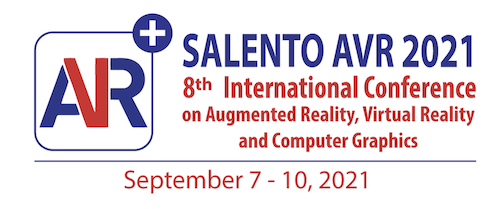SALENTO AVR 2021 provides an interactive and attractive forum for the cross fertilization of ideas, knowledge and scientific achievements. The conference solicits original contributions describing advancements of research and developments of Computer Graphics, Augmented Reality and Virtual Reality and is structured around the following five tracks:
Virtual reality enables users to experience a 3D environment generated using computer graphics and other sensory modalities in order to provide an environment for enhanced interaction between a human user and a computer-created world.
SALENTO AVR 2021 seeks original research papers in all areas of virtual reality. Topics of interest include, but are not limited, to the following areas:
- Artificial Reality
- Real-Time Rendering
- Collision detection in Virtual Reality
- 3D Interaction for Virtual Reality
- Modelling and Simulation
- Data Visualization in Virtual Reality
- Virtual Humans and Artificial Life
- Virtual Reality Systems and Toolkits
- Collaborative Virtual Environments
- Tele-Collaboration
- Virtual Reality System Architecture
- Immersive Technologies, Systems and Devices
- Immersive Environments
- Interactive Intelligent Environments
- Educational Simulations
- Simulator Design and Validation
- Human Computer Interaction
- Presence and Cognition in a Virtual Environment
- Integration of Virtual Reality and Multimedia
- Multi-User and Distributed Virtual Reality
- Haptics, Audio, and Other non-Visual Interfaces
- Tracking and Sensing
- Virtual Humans and Avatars
- Navigation in Virtual Environments
- Virtual Laboratories and Tools
- Understanding and Modelling of User Behavior in Virtual Environments
- Interaction in Virtual Environments
- Hardware Devices for Virtual Reality
- Cloud-Based Virtual Reality
- Teleoperation and Telepresence
- Simulation-based Learning
- Simulation in Healthcare Education
- Wearables as Input Interfaces for Virtual Reality
- Virtual Reality Applications in Medicine and Surgery
- Virtual Reality Applications in Rehabilitation
- Virtual Reality Applications in Cultural Heritage
- Virtual Reality Applications in Arts
- Virtual Reality Applications in Education
- Virtual Reality Applications in Military and Industry
- Machine Learning for Virtual Reality
Augmented reality enables users to experience a three-dimensional environment generated using computer graphics, and perhaps other sensory modalities, to provide an environment for enhanced interaction between a human user and a computer-created world. Augmented Reality allows the real-time fusion of computer-generated digital content with the real world. The virtual objects, displaying information that the user cannot directly detect with his own senses, enhance the users’ perceptions and help him to perform real-world tasks better.
SALENTO AVR 2021 seeks original research papers in all areas of augmented reality. Topics of interest include, but are not limited, to the following areas:
- Mixed Reality
- Information Visualization using Augmented Reality Technologies
- Visualization Techniques for Augmented Reality
- Augmented Reality in Scientific Visualization
- Mobile Augmented Reality
- Augmented Reality-based Navigation and Information Systems
- Location-based and Recognition-based Augmented Reality
- Visual Aspects of Augmented Reality
- Perceptual Issues in Augmented Reality
- Psychological and Artistic Issues of Integrating Virtual Objects with Real World
- Collaborative Augmented Reality Environments
- Augmented Reality Applications in Medicine and Surgery
- Augmented Reality Applications in Cultural Heritage
- Augmented Reality Applications in Arts
- Augmented Reality Applications in Education
- Augmented Reality Applications in Military and Industry
- Spatial Augmented Reality
- Machine Learning for Augmented Reality
Nowadays computer graphics is a central part of our lives, in movies, games, computer-aided design, virtual simulators, visualization and even imaging products and cameras. Computer graphics and interactivity play a central role in harnessing the users’ creativity, where stellar ideas blend with boundless artistry.
SALENTO AVR 2021 seeks original research papers in all areas of computer graphics. Topics of interest include, but are not limited, to the following areas:
- Physically Based Modelling
- Geometric Computing
- Shape and Surface Modelling
- Graphics Algorithms
- Web Based Graphics
- Computer Animation
- Perception of Computer Graphics and Animation
- Special Effects
- 3D Visualization
- Visualization Systems
- Multimedia and Digital Media
- Image-Based Computer Graphics
- Rendering Techniques
- Volume Visualization
- Scientific Visualization
- Real-Time Graphics
- Graphics System Architectures
- Graphics Hardware and Hardware-Related Techniques (GPU)
- Hardware for Visualization
- Data Compression for Graphics
- Computer Graphics for Small/Large Displays
- Parallelism in Computer Graphics
- Graphic Toolkits
- Interaction and HCI
- Interfaces for Creating and Editing Animations
- Autonomous Characters, Group and Crowd Behaviour
- Cloud Networks for Multimedia Applications
- Applications
Games and entertainment are present in all cultures and contribute to the social, emotional, psychological and physical well being of human society. As game and entertainment technologies become increasingly more pervasive and consequently we are continuously challenged in our work, learning and personal life by increased access to virtual spaces and communities that offer opportunities for everyday needs and aesthetic experiences.
SALENTO AVR 2021 seeks original research papers in all areas of games. Topics of interest include, but are not limited, to the following areas:
- Game design and development
- Development Tools in Gaming
- Development Methodologies in Gaming
- Tools and Technologies in Gaming
- Usability and Playability
- Immersive Gaming and Edutainment
- Pervasive Gaming
- Ubiquitous Games
- Games for Mobile Platforms
- Virtual Learning Environments
- Balance among Realism, Engagement, Learning and Entertainment
- Entertainment
- Game-Based Learning
- Virtual Collaborative Learning
- Multi-agent and Multi-strategy Games
- Realistic Games for Simulation and Training
- Serious Games
- Pedagogical Theories in Serious Games
- Methodologies and Principles for Serious Games User Assessment
- Advanced Human-Computer Interaction for Serious Games
- Serious games in Formal Education
- Educational Outcomes in Serious Games
- Verification of Learning Transfer in Serious Game
- Artificial Intelligence for Serious Games
- Serious Games in Health and Healthcare
- Serious Games in Public Health Education
- Serious Games in Rehabilitation
